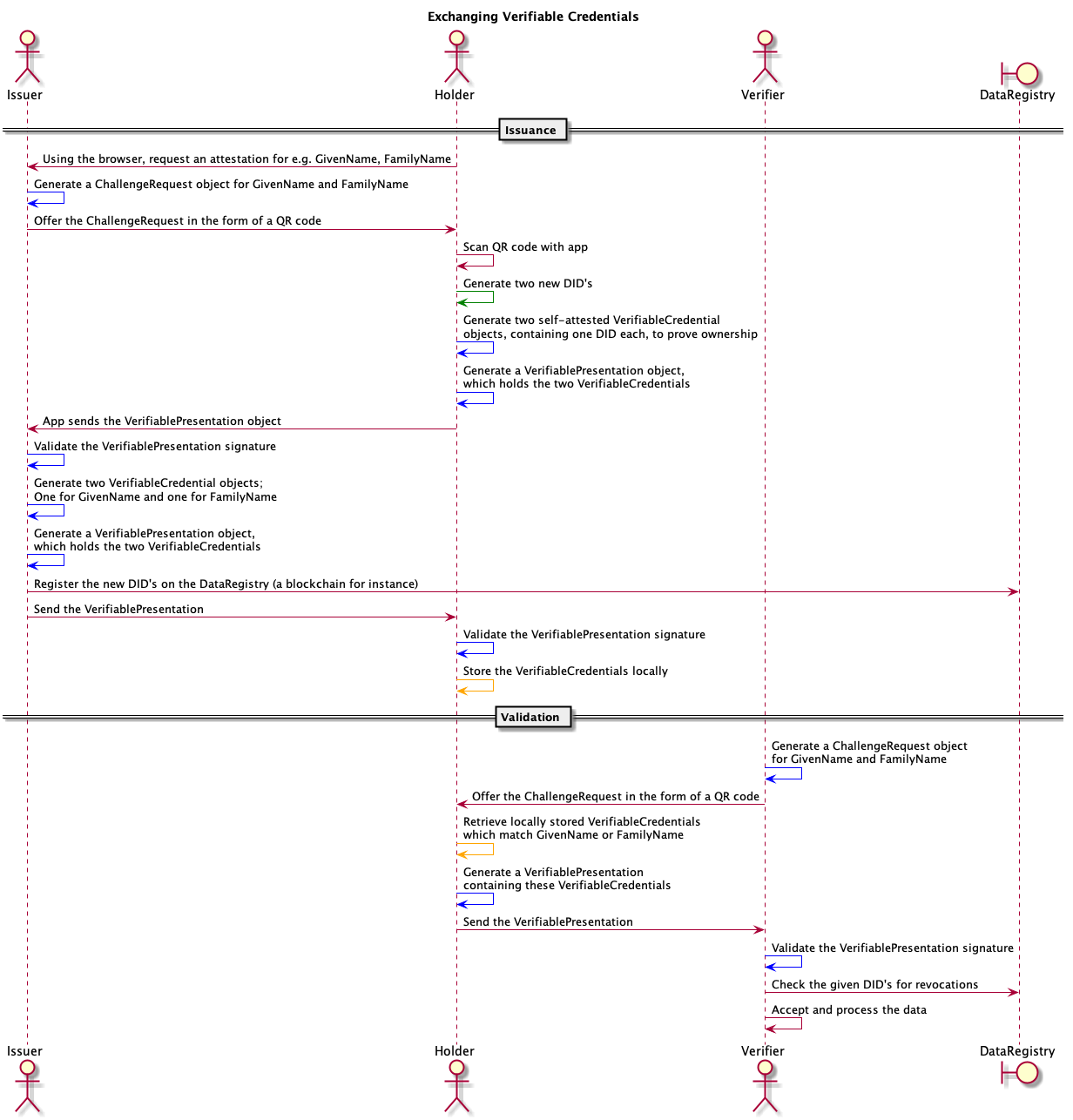vp-toolkit
A TypeScript/JavaScript API generating and signing w3c verifiable credentials and related objects:
- Verifiable Credential
- Verifiable Presentation
- Challenge Request
- Proof (will be part of the objects above)
Installation
In an existing project (with package.json), install vp-toolkit
npm install vp-toolkit --saveFlow
The verifiable credentials standard does not mention how the verifiable credentials will be exchanged from one party to another.
The flow will show an example of how you can utilize components of the vp-toolkit to exchange and generate verifiable credentials. Blue lines represent vp-toolkit interactions.
The green line can be a crypt-util interaction, the orange lines are vc-data-management interactions and the red lines need to be implemented by the developer.
Please note that crypt-util currently can't generate DID's, but it is able to generate public addresses.
Checking the DID's for revocation can be done using the vc-status-registry libray if you wish to implement an Ethereum solution.

Flexible setup
Because the w3c Verifiable Credential standards are still being crafted, we need this flexible setup comprising a generator, signer and crypt-util instance:
- The generator is responsible for the structure, integrity and completeness the final object shown in the list above;
- The signer only decides which fields (in what order) will be signed and validated, not how the fields are signed;
- crypt-util is responsible for signing/validating the payload given by the signer, using the given cryptographic algorithm.
A generator and signer is available for VerifiablePresentation, VerifiableCredential and ChallengeRequest. This setup allows every developer to change the behaviour in every phase of the process. You can add fields to the ChallengeRequest object by extending it, change the fields included in the signature and even switch to a different cryptographic algorithm.
Usage
Three examples of creating and validating objects.
Creating or validating a VerifiableCredential
A VerifiableCredential object can be created using the VerifiableCredentialGenerator. This generator needs a signer to sign the VerifiableCredential object. You can pass a VerifiableCredentialSigner instance to the Generator.
// Creating a VerifiableCredential object:cryptAlgorithm.importMasterPrivateKeyyourPrivateKey // The generator attaches a proof object to the verifiableCredential so it becomes cryptographically verifiable. console.logJSON.stringifyverifiableCredential, null, 2 // Validating a VerifiableCredential object:console.logsigner.verifyVerifiableCredentialverifiableCredential // true or falseCreating or validating a VerifiablePresentation
Using the same approach as creating a signed VerifiableCredential, you can create a VerifiablePresentation:
// Creating a VerifiablePresentation object:cryptAlgorithm.importMasterPrivateKeyyourPrivateKey // The generator attaches one proof object for each verifiableCredential, so the credential ownership becomes cryptographically verifiable. console.logJSON.stringifyverifiablePresentation, null, 2 // Validating a VerifiablePresentation object:console.logsigner.verifyVerifiablePresentationverifiablePresentation // true or falseCreating or validating a ChallengeRequest
// Creating a ChallengeRequest object:cryptAlgorithm.importMasterPrivateKeyyourPrivateKey// You can use toAttest and toVerify both at the same time, for instance if you require some credentials before issuing. console.logJSON.stringifychallengeRequest, null, 2 // Validating a ChallengeRequest object:console.logsigner.verifyChallengeRequestchallengeRequest // true or falseRunning tests
Besides unit testing with Mocha, the effectivity of all tests are also measured with the Stryker mutation testing framework.
npm run testnpm run strykerWe aim to achieve a coverage of 100%. Stryker and/or mocha test scores below 80% will fail the build.
Contributing
Pull requests are welcome. For major changes, please open an issue first to discuss what you would like to change.
Please make sure to update tests as appropriate.
License and disclaimer
apache-2.0 with a notice.
We discourage the use of this work in production environments as it is in active development and not mature enough.

